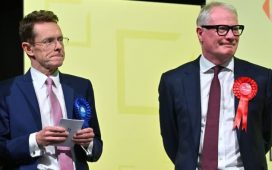This Premier League season will be remembered for many things: as the season when the Kop lost its Klopp, as the season of “Well done boys, good process”, as a time in which the “agent of chaos”, whether named Darwin or Jérémy or Kaoru or Kai, offered a brief and sparkling reprieve from the monotonous precision of the relentlessly rehearsed modern game. Mostly, though, it will be remembered as the season of teeth.
By near-universal consensus, the points deductions imposed on Everton and Nottingham Forest, as well as the ongoing investigation into Leicester City’s finances (not to mention the 115 charges still pending against Manchester City), prove at long last that the Premier League’s profitability and sustainability rules “have teeth” – or “unexpected teeth”, as one commentator put it. The Super League fiasco and the ongoing failure of the Premier League to secure an equitable deal for the distribution of media revenue down the football pyramid, meanwhile, have highlighted the need for a “regulator that has real teeth” – a need that the recently introduced football governance bill, many believe, may help address. The age of the soccer regulators is upon us, and suddenly their fangs are everywhere. Not since the days when Luis Suárez was feasting on the arms and shoulders of his opponents has there been quite so much attention paid in English football to matters of dentition.
There’s no question that we are traveling into an era of much more muscular governance of soccer, in England and across Europe. Rules that have existed in writing for years are now suddenly being enforced with surprising ferocity. Any measure to curb the financial excesses of the past two decades, even the playing field between English football’s giants and minnows, and put the sport on a more sustainable economic footing is surely a good thing – but how sharp are the new adjudicatory chompers bearing down on the English game, really? And what does this sudden flurry of regulatory activity mean for the owners of clubs like Chelsea, whose expectations of easy revenue generation now find themselves suddenly disturbed?
There’s a generous reading to all of this, which presents the recent regulatory outburst as proof of a sincere effort on the part of the Premier League to get its house in order and put top-flight football on a path to more equitable growth, and a cynical one, which holds that regulation is a useful facade to conceal and legitimize deeper inequalities within the game. With apologies to all the footballing nostalgics out there, who imagine that the Premier League is going to drop an adverse ruling against Manchester City on the penultimate day of the season and send the reigning champions packing to League Two, I tend towards the latter perspective.
The Premier League’s flurry of rulings and investigations into clubs that have fallen foul of its profitability rules only makes sense when viewed in the context of the UK government’s determination to create an independent football regulator. Both parties, the Premier League and the government, are now engaged in a form of regulatory competition to win the argument over who is best placed to steward the sport. Everything about the Premier League’s handling of the investigations to date – the strength of the sanctions, the ostentatious commitment to due process, the careful reasoning in the written rulings, the independence and impartiality of the commissions it’s empaneled to hear the cases – has been designed as a demonstration to the world that the Premier League is quite capable of regulating itself without the need for a pesky, state-created ombudsman to get involved. After the introduction of the football governance bill last month, the Premier League issued a comically tepid statement in which it pledged to “study” the bill while registering its “concern” about “any unintended consequences of legislation that could weaken the competitiveness and appeal of English football”.
The most important of the Premier League’s profitability and sustainability rules is the one that’s unwritten: enforcement cannot become so aggressive as to dull the global appeal of the league.
Whenever a principal empowers an agent and the agent begins to act against the interests of the principal, the problem of “agency costs” arises. The real test of how pointy the Premier League’s new machinery of self-regulation is will come when the commissions investigating financial breaches begin to act in a way that cuts into the interests of the league’s biggest clubs. Tellingly, it’s teams in the bottom half of the table – those on the way to almost-certain relegation or even, in Leicester’s case, already relegated – that have been punished first. Until we see one of the Big Six or Seven (or whatever we’re calling them now) take a hit, the agency costs of the Premier League’s new era of accountability will remain invitingly low for the clubs at the top.
There’s an existential issue at stake here: how far can independent commissions and regulators go, how effective and uncaptured can they really be, in a world where it’s still the clubs themselves that decide the rules and the distribution of revenue? The bigger clubs have outsized influence thanks to their history, financial heft, and global popularity. Until there’s blood on the floor from a Manchester City or a Chelsea or a Newcastle (just to take three random examples), the Premier League’s profitability and sustainability regime will always appear, to jaded eyes at least, like a feudal system of entrenched privilege that punishes the serfs while letting the lords off scot-free.
Already one can picture the lawyers at the top clubs probing the emerging jurisprudence on the profitability rules for signs of weakness, potential loopholes. Spending “in the general interests of football” does not count towards the assessment of profitability, which has generally been taken to mean that money can be allocated to club infrastructure, women’s teams, and youth academies without limit or sanction. This exemption, which – who knows? – could eventually become a useful sink in which to launder spending on player wages and transfers; it’s not hard to imagine a near future in which the finest academy facilities on the planet miraculously spring from the soil of England’s top clubs, and a cheese cave blooms in every stand throughout the land.
The big clubs might not even have to probe that far to find ways around the existing regulations, since those regulations are probably not long for this world. Lost in all the enthusiasm about the rise of the regulators has been an acknowledgment that the Premier League itself, as it announced a few weeks ago, is gearing up to completely revamp its architecture of financial governance. Regulation with teeth? Given their impending demise, the profitability and sustainability rules are a set of dentures at best. Most reports suggest that the Premier League will shift the focus of its financial controls from profitability to something closer to the “squad cost” ratio that Uefa has introduced. Instead of stipulating a hard currency limit to the annual losses a club can incur, as under the current profitability rules, this would involve limiting a club’s spending on wages and transfer fees to a set percentage of its revenue.
Whatever form it ultimately settles into, whether it targets profitability or squad cost, this new regulatory architecture almost certainly signals the end of the Premier League’s era of vanity ownership, under which Abramovich-style splashing of the cash, without regard for losses, became a viable pathway to generate on-field success. This is, naturally, a good thing, but it doesn’t necessarily portend a more equal world. A squad cost rule will effectively function as a kind of salary cap, but in only the softest sense, and with none of the additional balancing mechanisms (drafts, equal distribution of TV income) that make the capped and cartel-like leagues of the major US sports so consistently even. Without redistributive US-style controls to level the overall playing field, a squad cost rule will inevitably benefit bigger clubs, whose revenues dwarf those of the clubs below: Manchester City reported revenue of £712.8m last season, almost three times the £250m in income that Newcastle United – not exactly a club without means – recorded. Needless to say, surviving on 75%, say, of £712m represents a very different proposition to life under a fiscal ceiling that taps out at 75% of £250m.
For all clubs, revenue generation now looms as the key off-field challenge, which promises a future of higher ticket prices, more content deals and merchandising, and ever-intensifying (and ever-infantilizing) NFT-style assetization of fandom and the “fan experience”. A club like Chelsea seems especially squeezed. Whichever direction the Premier League’s financial rules evolve in, the west London club is going to have to find a way to live within its means and grow its revenue pot at a time when its relatively small stadium, correspondingly puny gate receipts, lavish recent spending, exotic amortization tricks, and now-consistent failure to break into the Champions League spots (with their attendant revenue bump) have left it financially vulnerable. If Chelsea’s new US private equity owners took over the club in the hope of generating a quick buck and making a tidy exit, they’re about to find out that at Stamford Bridge in the year of our lord 2024, there’s no easy way out.
after newsletter promotion
The Premier League has directly linked its sudden commitment to “swift development and implementation of a new league-wide financial system” to the ongoing struggle to reach a deal with the English Football League on the distribution of media revenues. Here, again, the urgency around the league’s actions and public declarations is linked to a desire to get ahead of the still-embryonic football regulator. Under the tabled bill, the regulator’s most important power, beyond its foundational licensing jurisdiction, is its authority to impose an agreement between the Premier League and the EFL on revenue distribution in the event of a negotiating deadlock. This has been hailed as a great advance for cross-league equity, and it’s certainly better than what we have today (a distributional economy run on prayer, shame, and Netflix documentaries), but as currently contemplated it’s a backstop power to be employed as an absolute last resort. In any event, the sums that are likely to flow to the EFL under future deals will remain a fraction of the TV revenues that clubs in the Premier League scoop up.
Even with an independent regulator in place, the distribution of media money in the top flight seems unlikely to ever be disturbed by basic considerations of fairness or competitive balance. The top clubs in the Premier League rake in far more from the blimp-like media deals that English football now commands than those further down the table do; half of that money is divided equally between the 20 clubs, and the other half ends up, essentially, in the pockets of the clubs at the top. Things work far more equitably in the world of US professional sports, but they work that way for various historical and cultural reasons that make the imposition of NFL- or NBA-style “socialism” in the Premier League – or anywhere else across European soccer’s top leagues – impractical, and therefore unlikely.
Under current conditions, the only way a more equitable redistribution of the Premier League’s media rights honey pot would materialize is if the top clubs made a conscious decision to forego the financial privileges they currently enjoy for the good of the game and ensure the money is divided equally between the league’s 20 teams. There’s no sign of those clubs ever displaying such generosity of spirit, which is what makes the Premier League’s ritual complaints about regulation potentially weakening the “competitiveness” of English football so grimly hypocritical: the major obstacle to a more even, unpredictable, and competitive Premier League is the clubs themselves, not some government regulator coming into outline far on the horizon.
The clubs, let’s not forget, are the Premier League: whatever the nominal independence and impartiality of English football’s regulators, present or future, and however effective they are in enforcing financial controls, economic and political power will always be tilted in favor of the top flight’s most successful and popular members. No matter what happens from here, the big clubs can always assert their power to award themselves a bigger share of the Premier League’s commercial revenue – whether that means a bigger share of broadcast money, more prize money, the money from a beefed-up pre-season competition, the proceeds from a special Thierry Henry-themed jewellery line, or whatever – and insulate themselves from regulator-enforced austerity. Other clubs further down the pole do not and will not enjoy that luxury.
The Premier League’s new era of accountability, however much it represents progress towards a fairer league, seems likely instead to entrench an existing equality deficit – between teams and divisions, above all, but also in the distance between owners and the fans, who will continue to be “engaged” and “heard” and condescended to without ever being meaningfully represented in the administration of their clubs. Regulation and financial controls won’t even the playing field in English football – they’ll institutionalize the advantages that big clubs already enjoy, while promoting a superficial transparency that will make future attempts to question the legitimacy of football’s administration all the harder. All the baring of teeth between the Premier League, the clubs, the UK government, and the putative regulator is a distraction from this blunt reality. Profitability? Sustainability? They’re whatever the teams at the top decide they are.











